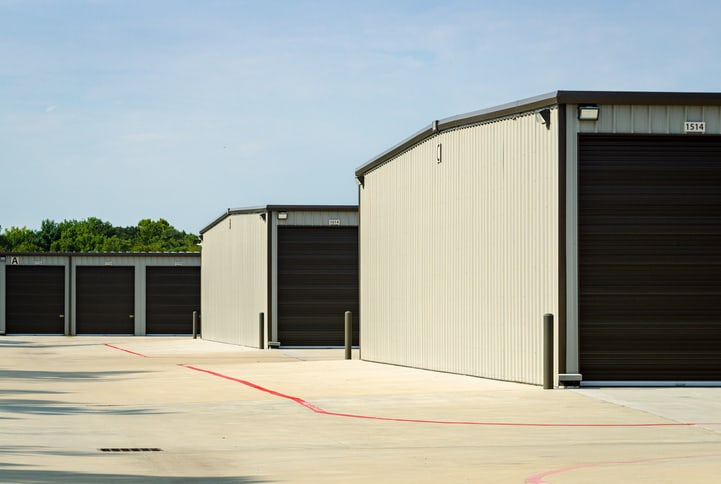What is a Self-Storage Qualified Opportunity Fund?

Investors can take advantage of several tools to invest in the self-storage sector. One of them is known as a self-storage Qualified Opportunity Fund.
This financial method lets you invest in a self-storage facility in an IRS-approved Qualified Opportunity Zone (QOZ) and receive certain tax incentives. A self-storage Qualified Opportunity Fund (QOF) is established by a company (such as an LLC) solely to invest in a self-storage property in one of these zones. Let’s take a closer look at this unique real estate investment opportunity:
- A Qualified Opportunity Zone is an economically distressed area where certain investments are eligible for tax breaks.
- A Qualified Opportunity Fund is a corporation or a partnership organized for the purpose of investing in qualified properties. The fund holds at least 90% of its assets in Opportunity Zone properties.
Finding Opportunity Zones
The Tax Cuts and Jobs Act of 2017 created Qualified Opportunity Zones with a goal of benefitting distressed communities by attracting economic development. More than 8,700 of these zones are scattered across the country. However, self-storage opportunities in these zones may not necessarily be plentiful. You can access an interactive map of all Opportunity Zones on HUD’s official website.
“Storage properties in Qualified Opportunity Zones can be difficult to locate. If a storage investor is fortunate enough to find one, proper due diligence is a must. The site should be a truly reliable opportunity that will enhance investment goals,” according to Pinnacle Storage Properties.
Tax Benefits of Qualified Opportunity Zone Investment
But if you are able to locate a self-storage property in an Opportunity Zone, it can be a lucrative undertaking thanks to three potential tax incentives provided to developers of commercial real estate, according to the Tax Policy Center.
1. Temporary deferral of taxes on previously earned capital gains.
Investors can place existing assets with accumulated capital gains in a Qualified Opportunity Fund. The existing capital gains aren’t taxed until the end of 2026 or until the asset is sold.
2. Basis step-up of previously earned capital gains invested.
For capital gains placed in a Qualified Opportunity Fund for at least five years, an investor’s basis on the original investment rises 10%. If invested for at least seven years, an investor’s basis on the original investment jumps 15%. Translation: An investor may be able to avoid taxes on 10% or 15% of the capital gains.
3. Permanent exclusion of taxable income on new gains.
For investments held at least 10 years, investors pay no taxes on any capital gains generated through their investment in a Qualified Opportunity Fund.
Hurdles to Investing in Opportunity Zones
Legislation pending in Congress would extend the Opportunity Zone program to the end of 2028, prolonging tax-advantaged investments in certain self-storage properties. However, some federal lawmakers aim to eliminate several types of real estate eligible for Opportunity Zone investments, including self-storage facilities. That means
Meanwhile, California, Massachusetts, Mississippi, New York and North Carolina had stepped away from the Opportunity Zone program as of June 2021, meaning investors can’t defer state taxes related to Opportunity Zone investments in those places. However, those investors can still receive federal tax benefits.
Despite any possible legislative hurdles, a 2021 survey by online real estate marketplace RealtyMogul found that 44% of investors were looking at investing in Opportunity Zones.
The Future of Qualified Opportunity Zones
President Joe Biden has said he plans to retain the Opportunity Zone program, although he does want to tighten government oversight of it. Some observers believe a proposal being floated by Biden to raise the rate on capital gains taxes for households earning more than $1 million a year could spur Opportunity Zone investments.
Two self-storage industry investors that are bullish on self-storage investments in Opportunity Zones are Inland Private Capital Corp. and Devon Self Storage. In September 2020, the two companies announced a partnership that targets self-storage investments in Opportunity Zones across the country.
“We believe the self-storage sector’s adaptability and lower correlated economic demand drivers position it well to achieve risk-adjusted returns,” Keith Lampi, president and chief operating officer of Inland Private Capital, said in a news release about the partnership.
Related Resources:

How to Start a Self-Storage Business
Launching a self-storage business for the first time? Start here and learn everything you need to know before you buy or build. Keep Reading

How Much Does it Cost to Build a Self-Storage Facility?
When you’re looking to develop a self-storage facility, you obviously must decide where to build it. Be prepared, finding a great site for storage can be tricky. Keep Reading

Building a Fortress: A Guide to Self-Storage Security
Need a little inspiration for advertising your self-storage facility? Check out these three examples to get your creative juices flowing. Keep Reading